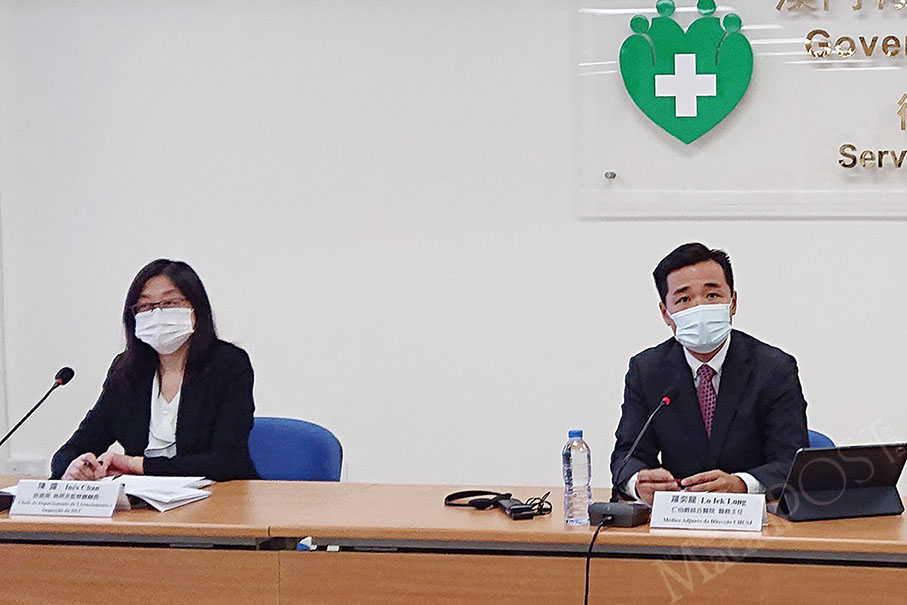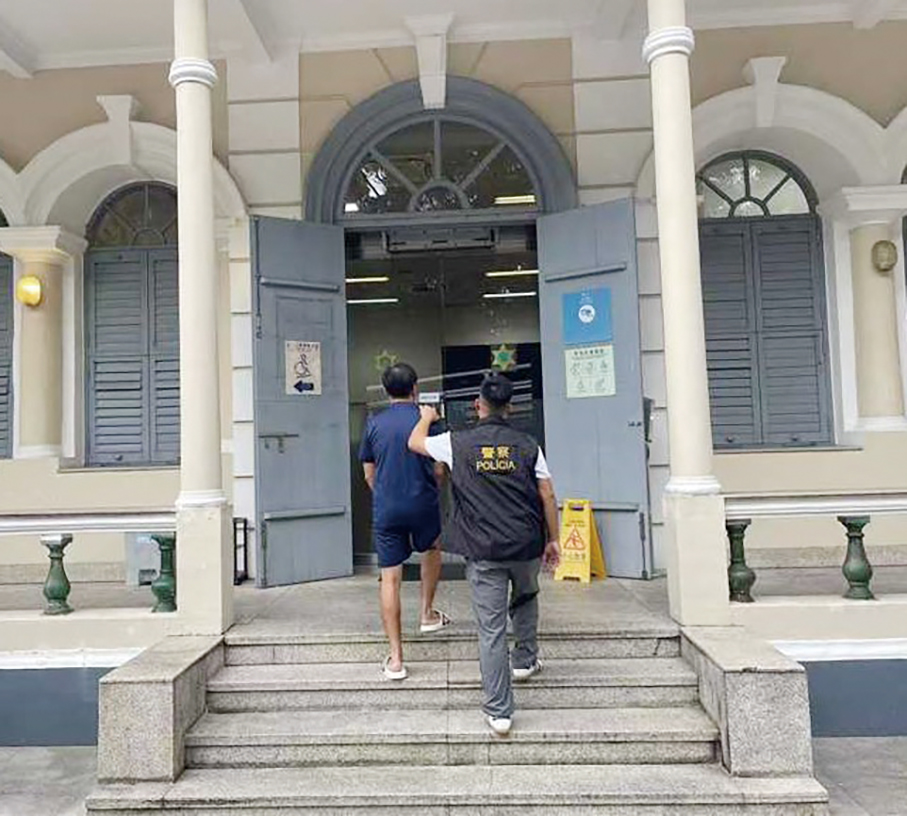Addressing yesterday’s press conference about Macau’s novel coronavirus (COVID-19) situation, Alvis Lo Iek Long, a clinical director of the public Conde de São Januário Hospital Centre, said that the new measure announced on Sunday aims to make it more convenient for Macau residents and non-resident workers to enter Macau via the Barrier Gate border checkpoint.

Alvis Lo Iek Long (right), one of the three clinical directors of the public Conde de São Januário Hospital Centre, speaks during yesterday’s press conference about the city’s novel coronavirus (COVID-19) situation, as Inês Chan Lou, who heads the Macau Government Tourism Office’s (MGTO) Licensing and Inspection Department, looks on. Photo: Tony Wong
Lo also said that Macau Health Code’s new validity of six hours was merely a complementary measure of the border crossing procedures for Macau-Zhuhai cross-border commuters, which did not affect the code’s one-day validity for residents to enter certain premises such as public administration offices in Macau.
The local government’s Novel Coronavirus Response and Coordination Centre announced the new measure in a statement on Sunday night, which said that when entering Macau via the Barrier Gate border checkpoint, Macau residents and non-resident workers whose Macau Health Code indicates green and displays a valid nucleic acid test (NAT) certificate can now be exempted from medical examinations and health inspections by Macau Health Bureau (SSM) staff and directly pass through e-channels at the checkpoint, provided that they have generated or renewed their Macau Health Code less than six hours before. The new e-channel measure took effect on Saturday.
The Macau Health Code, a QR three-colour code system, started operating on May 3 when it replaced the Health Bureau’s two previous digital health declaration systems that were required at border checkpoints and for entering public administration premises, casinos and other private premises.
Since May 11, all arrivals from the mainland have had to show a valid NAT certificate before being allowed to enter Macau. A valid NAT certificate refers to either a certificate proving that they have tested negative for COVID-19 within the past seven days, or a certificate indicating that they have had their sample collected at least 24 hours before. A traveller’s valid NAT certificate is displayed on the Macau Health Code if they have undergone the test in Macau, while the certificate is displayed on the Guangdong version of the mainland’s health code system if they have undergone the test in medical institutions recognised by the Zhuhai or Guangdong authorities.
The Macau Health Code and the Guangdong version of the mainland’s health code system have been mutually recognised since May 10. If a traveller’s valid NAT certificate is displayed on the Guangdong version of the mainland’s health code system, they will be required to switch the test result to the Macau Health Code when entering Macau, and vice versa.
Sunday’s statement also announced that the Macau Health Code began that day to show its validity time on the users’ smartphones. The statement did not further elaborate.
Certain groups of Macau-Zhuhai cross-border commuters are currently exempted from the 14-day quarantine measure imposed by the Guangdong government, such as: 1) Macau people who live in Zhuhai but work in Macau (with a Zhuhai residence permit), 2) Macau residents aged at least 70 or no older than 14, pregnant women, the disabled and the chronically sick (despite not holding a mainland residence permit), 3) Macau pupils and teachers who live in Zhuhai or Zhongshan, and 4) non-resident workers holding a Zhuhai ID card or residence permit. The Macau government has reaffirmed that having undergone a nucleic acid test does not mean that the person will then be exempted from the current 14-day quarantine measure imposed by Guangdong.
According to previous local government announcements, the e-channel service at Macau’s border checkpoints for mainlanders entering Macau had been suspended since late January after the COVID-19 epidemic emerged in Macau. Macau residents, however, can continue to use e-channels to pass through local border checkpoints. Lo said during yesterday’s press conference that before Saturday’s implementation of the new measure – which is only applicable to the Barrier Gate border checkpoint, those entering Macau had to undergo health inspections by Health Bureau staff first – namely showing their green Macau Health Code and valid NAT certificate, before passing through immigration counters or e-channels (e-channels only for Macau residents), adding that therefore they had to queue twice when entering Macau at local border checkpoints.
No longer checked by health staff
Lo said yesterday that the new measure – which has been implemented since Saturday – allows Macau residents and non-resident workers to directly pass through immigration at the Barrier Gate border checkpoint without needing to be checked by Health Bureau staff. Lo explained that after a Macau resident or non-resident worker has undergone a nucleic acid test – which has a validity of seven days – with its result displayed on the Macau Health Code, and has generated their code on their smartphones less than six hours before entering Macau via the Barrier Gate checkpoint, they can directly pass through immigration counters or e-channels at the checkpoint.
Lo said that during the process they only have to use their ID cards when passing through immigration as normal without any need to take out their smartphones to show their Macau Health Code.
Lo said that the new measure aims to make it faster for Macau residents and non-resident workers to pass through the Barrier Gate border checkpoint, adding that the new measure means that it combines the Health Bureau’s health inspections and the Public Security Police’s immigration procedures.
Health code still valid for whole day in Macau
Lo also clarified that with Saturday’s implementation of the new measure at the Barrier Gate border checkpoint, a person’s Macau Health Code on their smartphones started on Sunday to show a validity time of six hours, pointing out that this does not affect the code’s validity time of one whole day for entering certain premises in Macau such as casinos or government offices.
Before Sunday’s new measure, a person’s Macau Health Code on their smartphones showed a validity time of the same day after they had generated their code. With Sunday’s new measure, a person’s Macau Health Code on their smartphones now only shows a validity time of six hours after they have generated their code.Lo underlined that the new six-hour validity time aims to make it easier for Macau residents and non-resident workers to know how much time is left – after they have generated their Macau Health Code – before the expiration of the six-hour validity. Lo clarified that for the purposes of entering certain premises in Macau, the Macau Health Code is always valid for the same day when the code is generated, adding this means that residents are allowed to enter the various premises in Macau on any particular day as long as they show their Macau Health Code on their smartphone generated on the same day.
No case in 61 days
Meanwhile, Lo also pointed out that Macau has not confirmed a new COVID-19 case for 61 consecutive days. All of Macau’s 45 COVID-19 patients have been discharged from hospital. Lo said that one discharged patient is still undergoing recovery period isolation at the Health Bureau’s Public Health Clinical Centre in Coloane.
Govt pays ‘quarantine hotels’ 70 million patacas
Meanwhile, Inês Chan Lou, who heads the Licensing and Inspection Department of the Macau Government Tourism Office (MGTO), said during yesterday’s press conference that as of the end of last month the government had spent some 70 million patacas on quarantine facilities set up at local hotels.
At the peak in late March, there were 12 “quarantine hotels” with about 3,000 guestrooms when some 2,800 people were undergoing their 14 days of quarantine and medical observation. Since early April, most of the 12 hotels have returned to their normal hospitality role one after another once all those who completed their 14-day quarantine and medical observation had checked out.
Early last month, the 298-room Pousada Marina Infante hotel in Cotai became the only remaining “quarantine hotel” still operating after the other 11 hotels had returned to their normal hospitality roles. The government reopened a “quarantine hotel” on Sunday night – a section of the Sheraton Grand hotel in Cotai – as the Pousada Marina Infante hotel no longer had rooms available because more people have recently been required to undergo their 14 days of quarantine and medical observation in a government-arranged quarantine facility. The section of the Sheraton Grand hotel comprising 500 rooms – officially known as “special isolated area” – was once used as a designated hotel for quarantine and medical observation purposes.
Chan also said that the government had decided to reopen the section of the Sheraton Grand hotel as the additional “quarantine hotel” as it has more guestrooms compared to the other previous “quarantine hotels”, so as to ensure that there will be sufficient quarantine guestrooms for local residents studying overseas and planning to return to Macau for their summer break – whom the local government is planning to pick up from Hong Kong’s airport later this month upon their arrival there.
Chan said that about 400 Macau residents were slated to return to Macau in the second half of this month.







